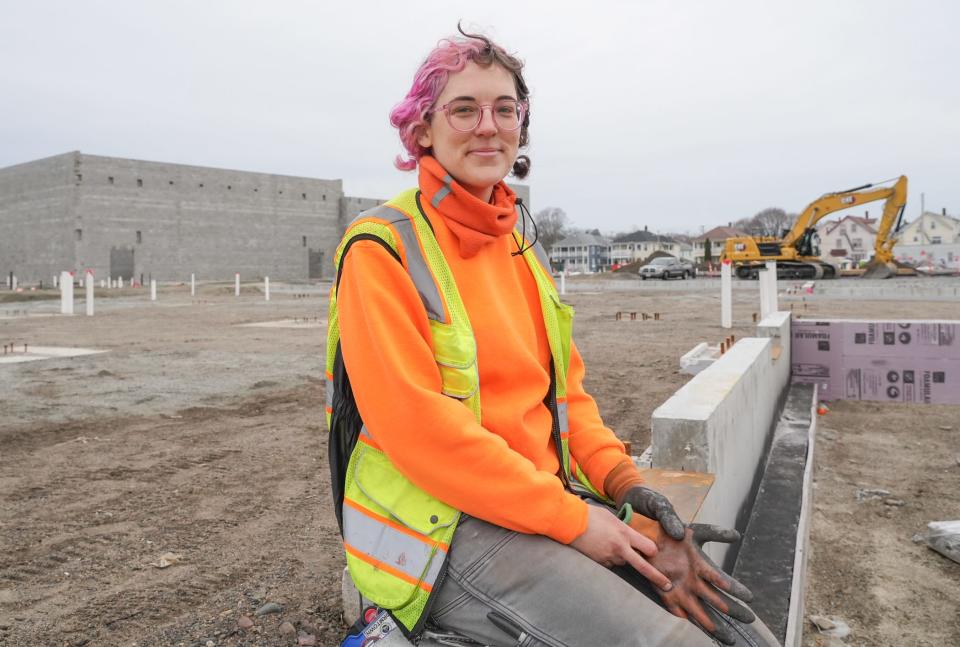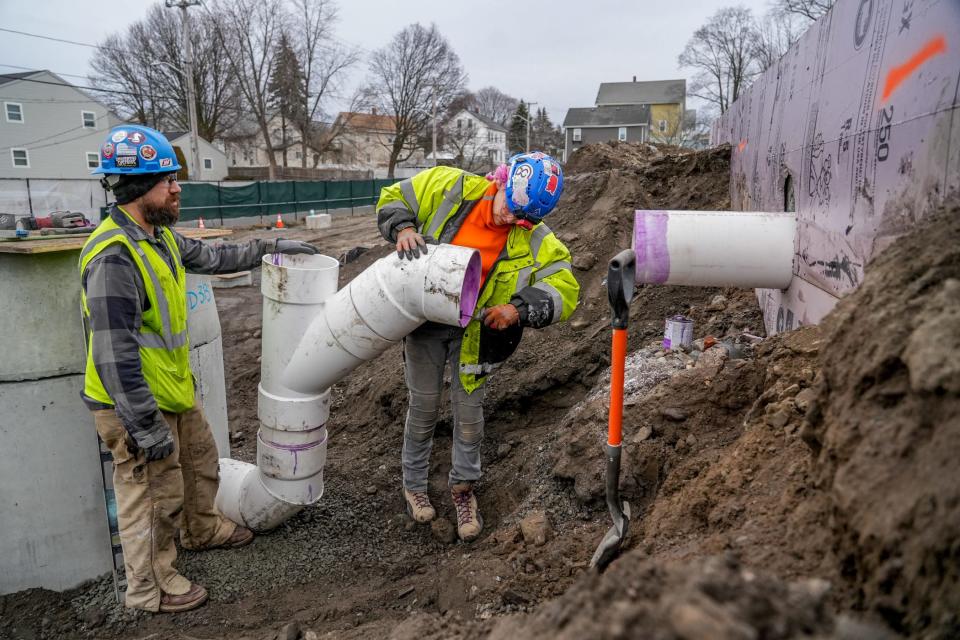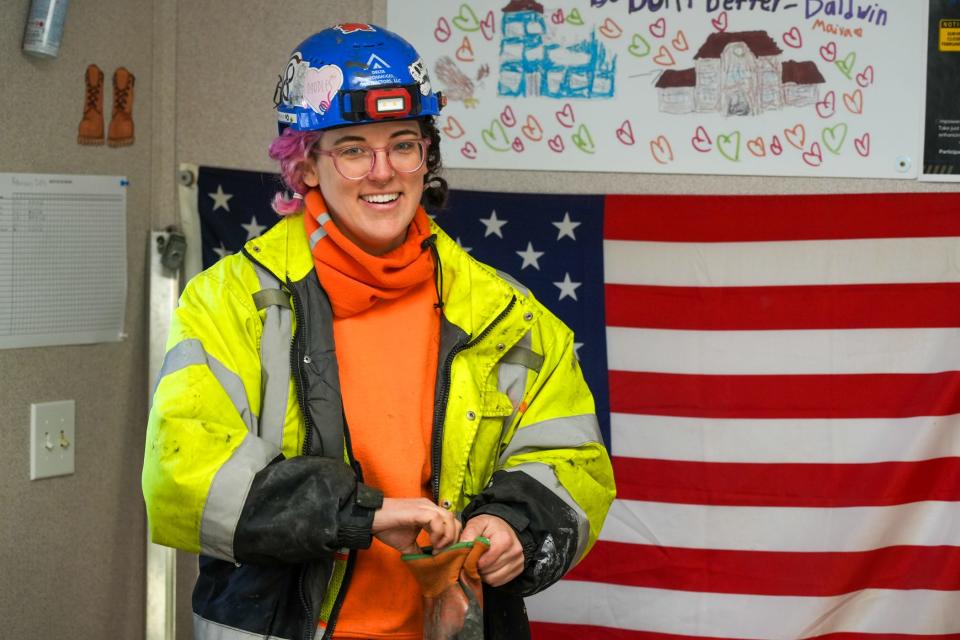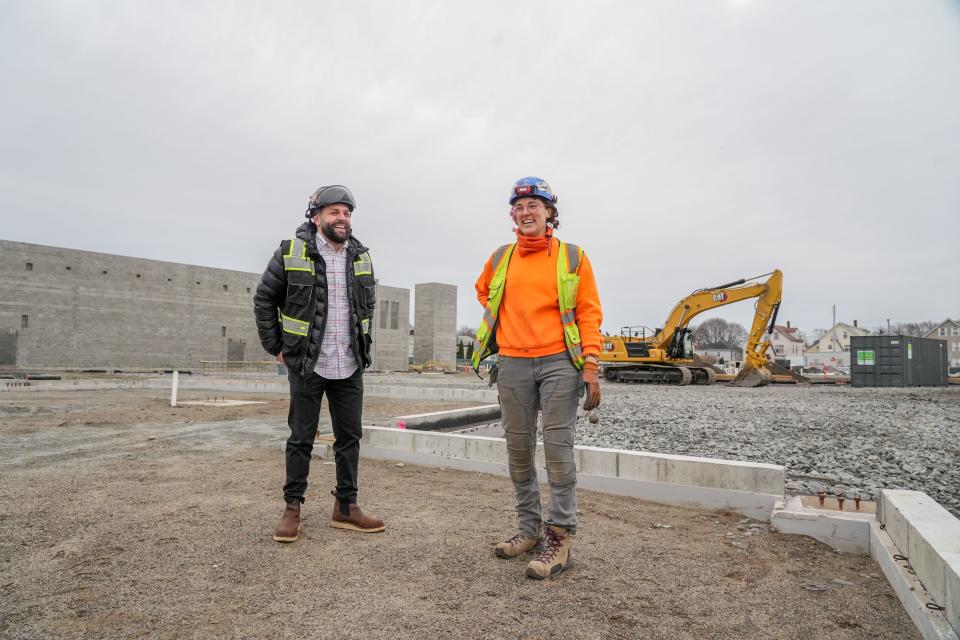Building trades are a pipeline to good jobs for women. How one plumber is making her mark.
On a cold February morning, a pair of construction workers were busy installing 10-inch PVC pipes, part of an elaborate storm drainage system for an elementary school in the heart of Pawtucket. The old Elizabeth Baldwin Elementary School had been demolished and in its place a new, nearly 98,000-square-foot building was starting to take shape. The Delta Mechanical crew carried and pieced the pipes together, ensuring their pitch was perfect and level.
The scene appeared typical of a construction site and may have been unremarkable but for the fact that one of the workers was a woman. Beneath a hard hat and safety goggles was Devyn Maher, an apprentice plumber.
“It’s nice to have something that challenges you physically, mentally, intellectually,” Maher said. “There’s also a lot of camaraderie on the job site, which is something I’m grateful for.”
As an apprentice, Maher was assigned to work with foreman Russell Michaud on the elementary school site. Both are members of UA Local 51, the union representing plumbers, pipefitters and refrigeration technicians in Rhode Island and Southeastern Massachusetts. In her close to five years as an apprentice, Maher has worked on a variety of projects, honing her skills under the tutelage of experienced plumbers. The vast majority of her colleagues have been men. Maher represents the small but growing number of women entering the building and construction trades.

“Historically, the participation of women in the unionized building trades, or any building trades, has been remarkably low, which is unconscionable, given that it’s one of the few areas where there’s pay equity across gender lines,” said Andrew Cortes, president and CEO of Building Futures Rhode Island. The nonprofit is a pre-apprenticeship program that serves as a pipeline between underserved and underrepresented communities and the unions.
“We actively recruit women to come to our pre-apprenticeship program to receive training, support and placement services within the building trades,” he said. “I’m very proud to say that, while still too low, 10% of our graduates are women who move into unionized construction trades.”
Holding a power tool changed her life
Maher is one of those success stories. Growing up in Newport, she had never been exposed to the trades or had an idea she was mechanically inclined. After graduating from William S. Rogers High School, she earned an undergraduate degree in economics from the University of Rhode Island. A few years later she was inspired to construct a harp and found a carpenter to show her the ropes. Her career track changed forever the first time she held a power tool.
“It was a jigsaw, and I had this thrilling feeling of 'This is what I want to be doing,’” she said.
Maher was working in residential construction when her younger sister told her about Building Futures. “I felt this opportunity hit me in the face, and I needed to take advantage of it,” she remembered.
Maher enrolled in their six-week program in 2018, switching her focus from carpentry to plumbing.
“I think that Rhode Island is special in the sense that we have programs like Building Futures and we have other workforce training,” said Maher, who now lives in Providence. “I imagine that in bigger cities and bigger markets it’s more competitive, and not as many know about these opportunities. I think here it’s within reach for everybody.”
What percentage of construction workers are women?
According to the U.S. Bureau of Labor Statistics, women accounted for approximately 10% of construction workers nationwide in 2020.
“I think historically, women have received the message that construction trade occupations were not for them,” said Cortes. “I’ve been in the trades for 35 years, and there’s many a job that out of hundreds of construction workers, there’s only one female. That dynamic needs to change.”
Maher agrees. Even as an apprentice she’s become an advocate for the recruitment and retention of women in the trades, taking on a leadership role in Local 51’s women’s group.
“We’re part of the Women’s Council of the Rhode Island Building and Construction Trades association,” she said. “We feel that it is important to give women in the trades a platform and a place for resources and to let them know that there are more of us out there. It’s nice to have a community [of women] within the larger community of construction.”
What unique challenges do women face in the building trades?
Maher, along with her fellow female Local 51 members, is focused on developing mentoring programs and addressing issues facing many of them, such as the feeling of isolation when they’re the only woman on a job site; the lack of personal protective equipment – such as gloves, vests and harnesses – that properly fits a woman’s body; and other potential roadblocks to retention.
She’s also finding ways to attract more women to the field.

“I think recruitment is an information issue more than anything,” Maher said. “Personally, I didn’t know the trades were a viable option for me. And, actually, being in a trade is an incredibly sustainable, well-paying, validating career for you to have.”
In fact, national statistics show that across industries, women, on average, make about 83% of what men earn for full-time work. But, according to Cortes, the unions’ collective bargaining ensures there is no pay gap between male and female members. It’s a point he often makes when recruiting more women to the trades.
'I realized, wow, you can make good money. It’s not just a job, it’s a career.'
Angel Conroy can speak from personal experience about her fulfilling career path. She joined Local 51 as an apprentice pipefitter in 2011. At the time, there were only five women out of nearly 700 members.
“It was lonely not having a lot of women around,” she recalled. “But the men were awesome. I had a really good class and am in a really nice local.” In her 13 years in the union, the ranks of women have grown to 26, but that number still accounts for only 4% of members. For the last few years, Local 51 has been actively working to increase women and minority representation.
“We’re not seeing as many women in the trades, because I don’t think they realize they’re capable,” Conroy said. “I don’t think they have the confidence as well as the right guidance on where to go.”
Conroy’s path started in high school, where she learned welding at a vocational technical school in Massachusetts.
“I knew when I was younger that I didn’t want to go to college, because I didn’t want to get into debt,” she said. “When I got into the trades I realized, wow, you can make good money. It’s not just a job, it’s a career.”

She’s heartened by the growing ranks of women, and particularly by Maher, who is already making an impact.
“Devyn’s one of the most supportive members, as a woman, in the local,” Conroy said. “I really look up to her, because she has a big heart and wants to do so much. She’s also excellent as an apprentice.”
Which projects has Maher worked on in Rhode Island?
Since starting her apprenticeship, Maher has worked on a variety of job sites. Her first was the state-of-the-art Lindemann Performing Arts Center at Brown University. Then came a pharmaceutical lab in South Providence, the Amazon Fulfillment Center in Johnston and the Pawtucket elementary school, among others – each highly technical and requiring different skills.
“The problem-solving aspect of it is really engaging,” she said. “You’re getting to scratch both parts of your brain, where you’re putting things together manually and using your hands, but you’re still really exercising your brain and trying to figure out how to do something better, or the right way.”
The importance of women supporting women in the industry
Her job performance speaks for itself.
“Everyone respects her, and that just shows you the type of person she is,” said Matt Price, project manager at Delta Mechanical, a subcontractor at the Pawtucket school site. “Everything that’s put in front of her she tackles. She’s a go-getter.”

Maher continues to work toward the 10,000 hours of on-the-job training she needs to complete her apprenticeship. She hopes to become a licensed plumber in 2025. In the meantime, she’ll keep blazing a trail for other women to join the ranks in the building and construction fields.
“I think that young leaders like Devyn are the right way to approach this,” said Cortes. “Her dedication to making sure that it’s an easier path where more women can take advantage of great careers as building tradespeople. That’s really powerful. We’re incredibly proud to work with her and to count her among our graduates. Quite honestly, I think that women like Devyn are part of the reason that women in the trades have such a bright future.”
Patricia Andreu, a freelance journalist living in Providence, writes Women In Action, a periodic column. Reach her at WomenInActionRI@outlook.com and follow her on Twitter: @ri_women.
This article originally appeared on The Providence Journal: Women in building trades: RI nonprofit provides pipeline to good jobs

